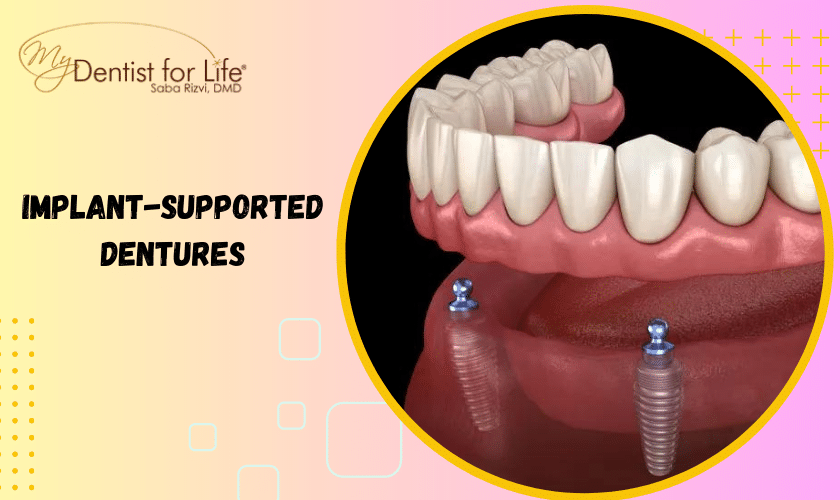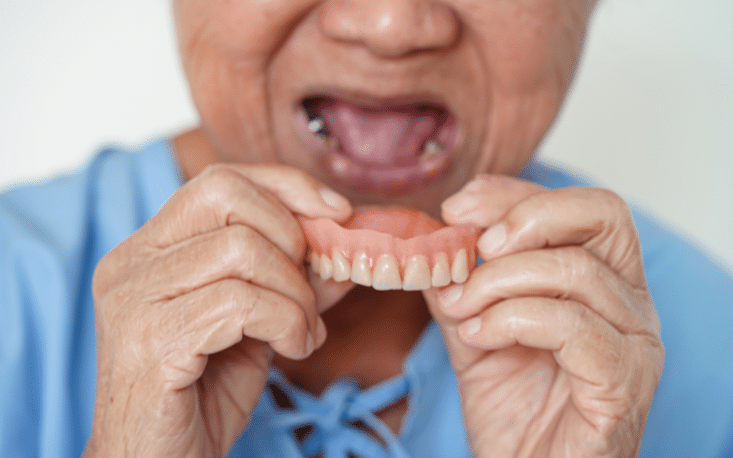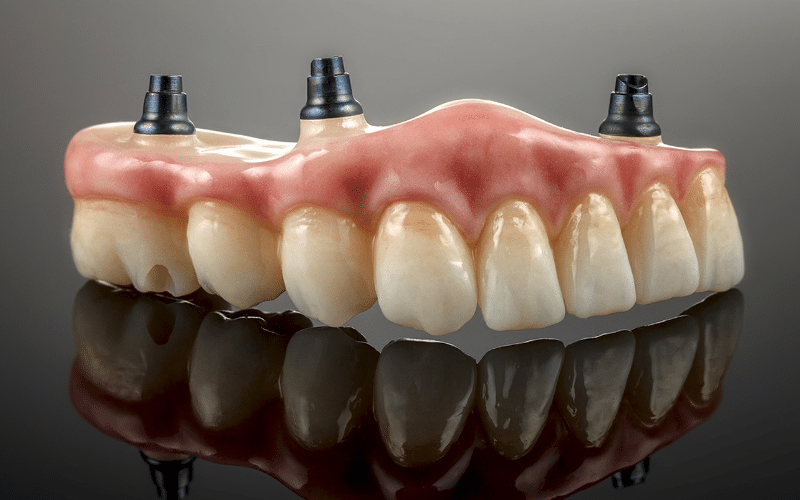ONLINE SCHEDULING AND VIRTUAL CONSULTS AVAILABLE

Understanding The Process Of Implant-Supported Dentures

Are you tired of dealing with the inconvenience and discomfort of traditional dentures? If so, implant-supported dentures may be the solution for you! These innovative dental appliances offer a more natural look and feel than traditional dentures, providing a comfortable and secure fit that can improve your quality of life. But how exactly do they work? In this ultimate guide, we’ll break down everything you need to know about implant-supported dentures, from their different types to the implantation process itself. So let’s dive in and discover how these incredible devices can help restore your smile.
What Are Implant-Supported Dentures?
Implant-supported dentures are a type of dental prosthesis that involves the use of dental implants to support removable dentures. Unlike traditional dentures, these appliances are anchored in place by titanium screws that replace missing teeth roots. This provides greater stability and comfort for patients who have lost most or all of their teeth.
Implant-supported dentures come in several different types, including fixed and removable options. Fixed implant-supported dentures are permanently attached to the implants and can only be removed by a dentist, while removable implant-supported dentures snap onto abutments on top of the implants.
The process of getting implant-supported dentures typically involves several stages. First, your dentist will perform a thorough examination to determine if you’re a good candidate for this procedure. Then, they will surgically place the dental implants into your jawbone using local anesthesia or sedation.
Afterward, it may take several months for the implants to fuse with your jawbone before attaching abutments that connect them to the prosthesis. Your customized prosthetic appliance will be secured onto your implanted posts – giving you back an attractive smile and normal oral functionality.
Implant-supported dentures offer numerous benefits over traditional solutions like standard complete or partial bridges and conventional full-mouth replacement arches; such as preventing bone loss in gums due to lack of natural tooth stimulation; improved speech ability; better biting force compared with other restorative techniques available today.
The Different Types Of Implant-Supported Dentures
When it comes to implant-supported dentures, there are several different types to choose from based on your specific needs and preferences. The most common types of implant-supported dentures include bar-retained, ball-retained, and fixed hybrid dentures.
Bar-retained dentures use a thin metal bar that follows the curve of the jawbone and is attached to two to five dental implants. Clips or other attachments secure the denture onto the bar for added stability.
Ball-retained dentures use a ball-and-socket mechanism in which each implant has a small ball attachment that fits into a corresponding socket on the underside of the denture. This type of system allows for some movement while still providing adequate support.
Fixed hybrid dentures, also known as screw-retained or permanent teeth replacement, involve attaching a custom-made prosthetic bridge onto four or more dental implants. This option provides maximum stability and durability but may require additional maintenance compared to other options.
Choosing the right type of implant-supported denture depends on various factors such as bone density, overall oral health, lifestyle habits, budget constraints, and personal preferences. It’s important to consult with an experienced dentist who can guide you through this decision-making process based on your unique circumstances.
How To Choose The Right Implant-Supported Denture For You
Choosing the right implant-supported denture for you can be a challenging task. There are several factors that you need to take into consideration before making your final decision.
Firstly, it is important to consult with your dentist and discuss what type of implant-supported denture would be suitable for you. Your dentist will conduct a thorough examination of your oral health and suggest which option will work best.
Next, think about your lifestyle and any activities that might impact the durability of the dentures. If you lead an active lifestyle or play contact sports, then it may be best to opt for more durable materials like zirconia or porcelain-fused-to-metal (PFM) implants.
Budget is also an important factor when choosing the right implant-supported denture. While some options may seem cost-effective initially, they may require frequent maintenance and repairs in the long run. Always weigh up all costs associated with each option before making a decision.
Don’t forget about aesthetics – after all, you want your new teeth to look as natural as possible! Discuss different tooth shapes and colors with your dentist until you find something that suits both functional needs and personal taste.
Remember; never rush into making this decision without carefully considering every aspect first.
The Implantation Process
The implantation process is the most crucial step in getting implant-supported dentures. Before starting the procedure, your dentist will conduct a thorough examination of your mouth and jawbone to determine if you are eligible for implants.
The first step in the implantation process involves placing titanium screws into your jawbone. These screws serve as anchors for your dentures. The surgery is performed under local anesthesia and takes around 1-2 hours.
After the screws are placed, there is a healing period that can last up to several months. During this time, osseointegration occurs – this is when the bone grows around the titanium screw and fuses it in place.
Once osseointegration is complete, abutments (small connectors) are attached to each screw. These abutments serve as an anchor for your new set of teeth.
Custom-made dentures are attached to these abutments using precision attachments or bars. Your dentist will ensure that they fit comfortably and look natural before sending you on your way with a brand-new smile!
While it may seem like a long process, getting implant-supported dentures can be life-changing for those who struggle with traditional sets slipping or feeling uncomfortable.
Caring For Your Implant-Supported Dentures
Once you have your implant-supported dentures in place, it’s important to take care of them properly. This will not only ensure their longevity but also keep your mouth healthy and free from infections.
The first step in caring for your implant-supported dentures is to maintain good oral hygiene by brushing twice a day with a soft-bristled toothbrush and using dental floss or interdental brushes. It’s also recommended that you use an antibacterial mouthwash.
You should avoid eating hard, crunchy foods like popcorn kernels as these can damage the implants or cause them to become loose. Sticky foods like caramel or chewing gum should also be avoided as they can pull on the denture and put pressure on the implants.
Regular visits to your dentist are essential for maintaining optimal oral health. Your dentist will check the fit of your denture and make any necessary adjustments. They’ll also clean around the implants and assess whether there are any signs of infection.
Implant-supported dentures require proper maintenance just like natural teeth do. By following these simple steps, you’ll be able to enjoy all the benefits that come with this type of restoration without worrying about any complications down the road.
Implant-supported dentures are an excellent option for those looking to replace missing teeth. With the ability to improve your speech, chewing abilities, and overall quality of life, it’s easy to see why they’re becoming more popular every day.
By understanding the different types of implant-supported dentures available, how to choose the right one for you, and what happens during the implantation process, you can be well-informed and confident in your decision.
Remember that caring for your new implants is also essential. Always follow proper oral hygiene practices and attend regular dental check-ups with your dentist.
If you have any questions about whether or not implant-supported dentures are right for you or need more information on getting them fitted correctly – please contact a qualified dental professional who will be happy to answer all of your queries.





